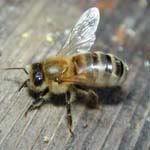Federal scientists are researching whether the same industrial chemicals blamed for sickening and killing thousands of pets are responsible for decimating the honeybee population.
No link has been found, but researchers at the Department of Agriculture's Bee Research Laboratory and the Food and Drug Administration's Center for Veterinary Medicine are testing commercial bee feed for melamine-related compounds and doing feed tests on honeybees.
"I was curious enough and wanted to be complete enough that I thought it was worth doing," Jeffery Pettis, the bee lab's research leader, told the Pittsburgh Tribune-Review on Thursday.
Honeybees in the United States began dying off in unprecedented numbers late last year, threatening the nation's human food supply, a third of which is dependent on bee pollination. A quarter of the nation's 2.4 million honeybee colonies died from what scientists dubbed Colony Collapse Disorder.
Early this year, cats and dogs fell critically ill with kidney disease, prompting a widespread pet food recall of more than 150 brands since March 16. Melamine, a chemical used in plastics, and cyanuric acid, used in pool chlorination, were found in the foods and in the infected animals' urine and kidneys.
That investigation snowballed to include much of the human food supply last month, when federal officials discovered animal and fish feed contained tainted ingredients. They found melamine in hog urine and learned some Chinese businesses routinely added industrial chemicals to products for years.
Melamine and cyanuric acid falsely elevate protein levels, making ingredients appear more nutritious than they are.
Since some commercial bee feeds are protein-based, using ingredients like brewer's yeast and soy flour, the possibility that melamine could be causing the unexplained bee die-off is worth investigating, Pettis said.
Commercial bee keepers use bee food and they often use soy flour:
Soy flour – Soy flour is the main non floral protein supplement for honey bees rations.
It comes in two forms, either Expeller press which has 6% soy oil, or Defat soy flour (chemically extracted) which has only 2% soy oil. The crude protein level is 48% 50%. Soy flour is more of an adult bee feed and appears to assist in making adult bees more active while on a honey flow.
Expeller press soy flour is more palatable to the bees than defat soy flour. This was demonstrated in trials conducted on the preference or palatability of protein feed for bees, Expeller press soy flour is good when there is limited pollen available. Defat soy flour is satisfactory when reasonable volumes of low quality ground flora pollen is being collected by the bees.

No comments:
Post a Comment